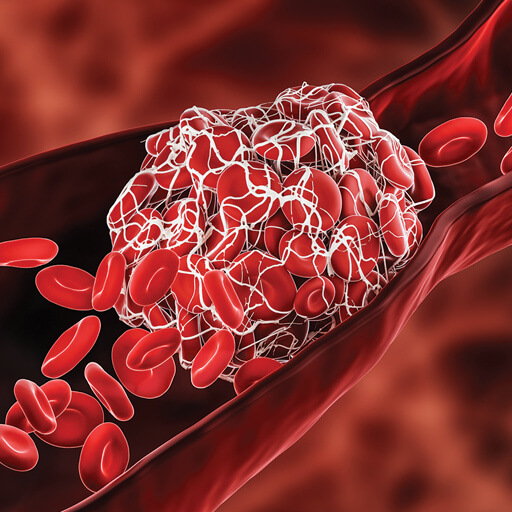Cardiology CME
31 - 45 of 61 results
-
FREE
ScientiaCME Updates in the management of familial chylomicronemia syndrome (FCS): best practices and emerging therapies
Activity Description / Statement of Need:
In this online, self-learning activity:Familial chylomicronemia syndrome (FCS) is an ultrarare genetic disease characterized by the buildup of chylomicrons – the largest lipoprotein – as a result of loss of function of one of five genes responsible for lipolysis. Its estimated prevalence is one in one million people and affects patients of all ages. The clinical presentation of FCS varies but includes patients with triglyceride (TG) levels over 10 times and up to a hundred-fold times the upper limit of normal. Complications include eruptive xanthomas on the trunk and extremities, lipemia retinalis, recurrent abdominal pain, hepatosplenomegaly, fatigue, cognitive disorientation, organ failure, necrosis, and pancreatitis, the latter of which is associated with a five- to 30-percent mortality rate in patients affected by FCS. Unfortunately, due in part to the rarity of the condition, patients are commonly undiagnosed, even by endocrinologists.
Target Audience:
See full details chevron_right
HCPs including: endocrinologists, cardiologists, and primary care physicians; physician assistants, nurse practitioners, and pharmacists who practice in the aforementioned areas of specialty; and those who otherwise have an interest in or commonly care for or clinically encounter patients with FCS.- Cost: Free
- Credit hours: .75
- CME credits awarded by: ScientiaCME
- Format: On-Demand Online
- Material last updated: December 21, 2023
- Expiration of CME credit: December 21, 2025
-
CODE CME20 FOR 20% OFF ($395 MINIMUM PURCHASE)
Oakstone CME Thrombosis & Thromboembolism
Learn Now: Thrombosis CME from the Experts
This online CME course from the North American Thrombosis Forum provides a comprehensive review of the most significant changes and advances impacting the care of patients who have — or are at risk for — thrombotic disorders. World-renowned experts and leading clinical faculty share key updates on the prevention, diagnosis, and treatment of thrombosis and related conditions.
Thrombosis and Thromboembolism is continuing medical education that will help you to:
- Identify the etiology and pathophysiology of atherothrombosis
- Recognize the link between inflammation and thrombotic illnesses
- Explain new tools for stroke prevention and prediction in atrial fibrillation
- Identify the optimal duration of anticoagulation for PE and DVT
- Provide advanced therapies such as thrombolysis, catheter-directed therapy, and surgical embolectomy
- Explain the connection between diabetes, metabolic syndrome, and major adverse cardiac events
- Provide patients with useful insights into how a heart-healthy diet can help prevent thrombosis
- Manage a high-risk pregnancy
- And more…
- Cost: $895
- Credit hours: 12
- CME credits awarded by: Oakstone Publishing
- Format: On-Demand Online
- Material last updated: 12/31/2022
- Expiration of CME credit: 12/31/2025
-
FREE
ScientiaCME Best practices and next directions in the management of chronic heart failure with reduced ejection fraction (HFrEF): getting to the heart of the matter
- Cost: Free
- Credit hours: 1
- Format: On-Demand Online
- Material last updated: 06/15/2024
- Expiration of CME credit: 06/15/2026
-
USE CODE CMELIST10 FOR 10% OFF THIS CME
A Nationally Approved CME/CE Medical Marijuana Course V2 – TheAnswerPage
The course introduces the reader to the endocannabinoid system and its interaction with the components of the cannabis plant, and addresses various aspects of medical marijuana, including administration, therapeutic use, drug metabolism, physiologic and cognitive effects, potential risks, and drug interactions.
The use of marijuana in obstetric patients, pediatric patients, adolescent patients and elderly patients is discussed in detail. Important considerations for patients with ischemic heart disease, hepatic disease, psychotic illness, and those with a history of drug dependence are also provided.
See full details chevron_right- Cost: $120
- Credit hours: 3
- CME credits awarded by: ACCME – AMA PRA Category 1 Credits™, ACPE, AANP, ANCC, AGD PACE
- Format: On-Demand Online
- Material last updated: 05/21/2025
- Expiration of CME credit: 5/21/26
-
USE CODE CMELIST10 FOR 10% OFF THIS CME
The Use of CBD in Clinical Care V2 – TheAnswerPage
CBD in Clinical Care provides information that will assist clinicians in effectively treating and counseling cannabidiol (CBD) consumers. The physiological effects of CBD, CBD drug interactions, CBD’s side effects, and the conditions for which CBD has been shown by evidence-based clinical studies to be efficacious are all discussed in this course.
See full details chevron_right- Cost: $80
- Credit hours: 2
- CME credits awarded by: ACCME – AMA PRA Category 1 Credits™, ACPE, AANP, ANCC, AGD PACE
- Format: On-Demand Online
- Material last updated: 05/21/2025
- Expiration of CME credit: 05/21/2026
-
USE CODE CMELIST10 FOR 10% OFF THIS CME
New York Medical Cannabis Program Required Course Bundle – TheAnswerPage
The New York Medical Cannabis Program Required Course Bundle has been approved by the New York State Office of Cannabis Management and satisfies the New York educational requirements to become a practitioner with the New York Medical Cannabis Program.
This bundle introduces the reader to the endocannabinoid system and its interaction with the components of the cannabis plant, and addresses various aspects of medical marijuana, including administration, therapeutic use, drug metabolism, physiologic and cognitive effects, potential risks, and drug interactions.
The use of marijuana in obstetric patients, pediatric patients, adolescent patients and elderly patients is discussed in detail. Important considerations for patients with ischemic heart disease, hepatic disease, psychotic illness, and those with a history of drug dependence are provided.
The New York State Medical Cannabis Program Rules and Regulations are outlined in a state-specific course, as well.
See full details chevron_right- Cost: $165
- Credit hours: 3
- CME credits awarded by: ACCME – AMA PRA Category 1 Credits™, ACPE, AANP, ANCC, AGD PACE
- Format: On-Demand Online
- Material last updated: 05/21/2025
- Expiration of CME credit: 05/21/2026
-
USE CODE CMELIST10 FOR 10% OFF THIS CME
Ohio Healthcare Provider Medical Marijuana Course Bundle for Certification (or maintenance of the CTR) – TheAnswerPage
The Ohio Healthcare Provider Medical Marijuana Course Bundle for Certification (or maintenance of the CTR) is certified by the Ohio State Medical Association and satisfies the CME requirements for the initial Ohio Certificate to Recommend (CTR) application or for maintenance of the CTR.
This bundle introduces the reader to the endocannabinoid system and its interaction with the components of the cannabis plant, and addresses various aspects of medical marijuana, including administration, therapeutic use, drug metabolism, physiologic and cognitive effects, potential risks, and drug interactions.
The use of marijuana in obstetric patients, pediatric patients, adolescent patients and elderly patients is discussed in detail. Important considerations for patients with ischemic heart disease, hepatic disease, psychotic illness, and those with a history of drug dependence are provided.
The Ohio Medical Marijuana Control Program rules and regulations are outlined in a state-specific course, as well.
See full details chevron_right- Cost: $165
- Credit hours: 3
- CME credits awarded by: ACCME – AMA PRA Category 1 Credits™, ACPE, AANP, ANCC, AGD PACE
- Format: On-Demand Online
- Material last updated: 05/21/2025
- Expiration of CME credit: 05/21/2026
-
USE CODE CMELIST10 FOR 10% OFF THIS CME
Pennsylvania Medical Marijuana Program Required Course Bundle – TheAnswerPage
The Pennsylvania Medical Marijuana Program Required Course Bundle has been approved by the Pennsylvania Department of Health and satisfies the Pennsylvania educational requirements to become a practitioner with the Pennsylvania Medical Marijuana Program.
This bundle introduces the reader to the endocannabinoid system and its interaction with the components of the cannabis plant, and addresses various aspects of medical marijuana, including administration, therapeutic use, drug metabolism, physiologic and cognitive effects, potential risks, and drug interactions.
The use of marijuana in obstetric patients, pediatric patients, adolescent patients and elderly patients is discussed in detail. Important considerations for patients with ischemic heart disease, hepatic disease, psychotic illness, and those with a history of drug dependence are provided.
This course bundle also addresses the use of cannabidiol (CBD) in clinical care, and the information will assist clinicians in effectively treating and counseling CBD consumers. The physiological effects of CBD, CBD drug interactions, CBD’s side effects, and the conditions for which CBD has been shown by evidence-based clinical studies to be efficacious are all discussed in this course bundle.
The Pennsylvania Medical Marijuana Program rules and regulations are outlined in a state-specific course, as well.
See full details chevron_right- Cost: $189
- Credit hours: 5
- CME credits awarded by: ACCME – AMA PRA Category 1 Credits™, ACPE, AANP, ANCC, AGD PACE
- Format: On-Demand Online
- Material last updated: 5/21/25
- Expiration of CME credit: 5/21/26
-
USE CODE CMELIST10 FOR 10% OFF THIS CME
Utah Medical Cannabis Program Required Course Bundle – TheAnswerPage
The Utah Medical Cannabis Program Required Course Bundle has been approved by the Utah Department of Health and satisfies the Utah educational requirements to become a practitioner with the Utah Medical Cannabis Program.
The Utah Medical Cannabis Program Required Course Bundle introduces the reader to the endocannabinoid system and its interaction with the components of the cannabis plant, and addresses administration, therapeutic use, drug metabolism, physiologic and cognitive effects, potential risks, and drug interactions.
The use of marijuana in obstetric patients, pediatric patients, adolescent patients and elderly patients is discussed in detail. Important considerations for patients with ischemic heart disease, hepatic disease, psychotic illness, and those with a history of drug dependence are provided.
This course bundle also provides information that assists clinicians in effectively treating and counseling CBD consumers.
See full details chevron_right- Cost: $150
- Credit hours: 5
- CME credits awarded by: ACCME – AMA PRA Category 1 Credits™, ACPE, AANP, ANCC, AGD PACE
- Format: On-Demand Online
- Material last updated: 05/21/2025
- Expiration of CME credit: 05/21/2026
-
USE CODE CMELIST10 FOR 10% OFF THIS CME
West Virginia Medical Cannabis Program Required Course Bundle – TheAnswerPage
The West Virginia Medical Cannabis Program Required Course Bundle has been approved by the West Virginia Department of Health and Human Resources, Bureau for Public Health, Office of Medical Cannabis and satisfies the West Virginia educational requirements to become a practitioner with the West Virginia Medical Cannabis Program.
This course introduces the reader to the endocannabinoid system and its interaction with the components of the cannabis plant, and addresses administration, therapeutic use, drug metabolism, physiologic and cognitive effects, potential risks, and drug interactions.
The use of marijuana in obstetric patients, pediatric patients, adolescent patients and elderly patients is discussed in detail. Important considerations for patients with ischemic heart disease, hepatic disease, psychotic illness, and those with a history of drug dependence are provided.
This course bundle also addresses the use of cannabidiol (CBD) in clinical care, and the information will assist clinicians in effectively treating and counseling CBD consumers. The physiological effects of CBD, CBD drug interactions, CBD’s side effects, and the conditions for which CBD has been shown by evidence-based clinical studies to be efficacious are all discussed in this course bundle.
The West Virginia medical cannabis program rules and regulations are outlined in a state-specific course, as well.
The West Virginia medical cannabis program rules and regulations are outlined in a state-specific course, as well.
See full details chevron_right- Cost: $189
- Credit hours: 5
- CME credits awarded by: ACCME – AMA PRA Category 1 Credits™, ACPE, AANP, ANCC, AGD PACE
- Format: On-Demand Online
- Material last updated: 5/21/25
- Expiration of CME credit: 5/21/26
-
CODE CME20 FOR 20% OFF ($395 MINIMUM PURCHASE)
Oakstone CME Cleveland Clinic Nephrology Update
Essential Updates in Nephrology CME
The Cleveland Clinic Nephrology Update online video CME program covers the latest advancements in nephrology, focusing on practical applications in clinical practice. Through informative lectures, case discussions, and Q&A sessions, you’ll gain diagnostic and management strategies for your patients with kidney disease. It’s a useful continuing medical education resource for updates on:
• Chronic kidney disease care
See full details chevron_right
• Dialysis access and “conservative” care
• Glomerular diseases
• Vasculitis
• Onco-nephrology
• Monoclonal gammopathy of renal significance
• Obstetric nephrology
• Kidney transplantation- Cost: $895
- Credit hours: 20.75
- CME credits awarded by: Oakstone Publishing
- Format: Online Video
- Material last updated: June 30, 2025
- Expiration of CME credit: June 29, 2028
-
Waikiki, Hawaii CME Conference – February 4-7, 2026 – Outpatient Medicine Update
Experience the ultimate CME working vacation with our Outpatient Medicine Update conference! Attend LIVE dynamic classes taught by practicing physicians and earn 16 accredited CME credits.
BENEFITS OF ATTENDING
- LIVE classes taught by practicing physicians.
- Course schedule – Wednesday to Saturday, 7:30-11:30 a.m.
- Live streaming available.
- Afternoons free to enjoy the rest of your day to explore and unwind.
- 3-month access to Outpatient Medicine Update On Demand ($695 value with up to 16 additional credits).
- Cost: $1095
- Credit hours: 16
- CME credits awarded by: Jointly provided by Partners for Advancing Clinical Education (PACE) and CME Vacations, LLC
- Format: Live Conference
-
Cancun/Riviera Maya, Mexico CME Conference – February 25-28, 2026 – Hospital Medicine Update
Experience the ultimate CME working vacation with our Hospital Medicine Update conference! Attend LIVE dynamic classes taught by practicing physicians and earn 16 accredited CME credits.
BENEFITS OF ATTENDING
- LIVE classes taught by practicing physicians.
- Course schedule – Wednesday to Saturday, 7:30-11:30 a.m.
- Live streaming available.
- Afternoons free to enjoy the rest of your day to explore and unwind.
- 3-month access to Outpatient Medicine Update On Demand ($695 value with up to 16 additional credits).
- Cost: $995
- Credit hours: 16
- CME credits awarded by: Jointly provided by Partners for Advancing Clinical Education (PACE) and CME Vacations, LLC
- Format: Conference
-
San Diego CME Conference – March 11-14, 2026 – Outpatient Medicine Update
Experience the ultimate CME working vacation with our Outpatient Medicine Update conference! Attend LIVE dynamic classes taught by practicing physicians and earn 16 accredited CME credits.
BENEFITS OF ATTENDING
- LIVE classes taught by practicing physicians.
- Course schedule – Wednesday to Saturday, 7:30-11:30 a.m.
- Live streaming available.
- Afternoons free to enjoy the rest of your day to explore and unwind.
- 3-month access to Outpatient Medicine Update On Demand ($695 value with up to 16 additional credits).
- Cost: $995
- Credit hours: 16
- CME credits awarded by: Jointly provided by Partners for Advancing Clinical Education (PACE) and CME Vacations, LLC
- Format: Live Conference
-
Waikiki, Hawaii CME Conference – April 8-11, 2026 – Hospital Medicine Update
Experience the ultimate CME working vacation with our Hospital Medicine Update conference! Attend LIVE dynamic classes taught by practicing physicians and earn 16 accredited CME credits.
BENEFITS OF ATTENDING
- LIVE classes taught by practicing physicians.
- Course schedule – Wednesday to Saturday, 7:30-11:30 a.m.
- Live streaming available.
- Afternoons free to enjoy the rest of your day to explore and unwind.
- 3-month access to Outpatient Medicine Update On Demand ($695 value with up to 16 additional credits).
- Cost: $1095
- Credit hours: 16
- CME credits awarded by: Jointly provided by Partners for Advancing Clinical Education (PACE) and CME Vacations, LLC
- Format: Conference














